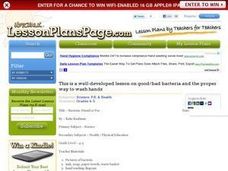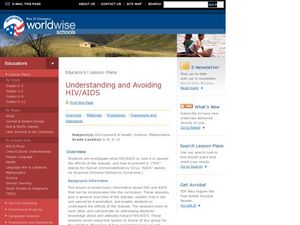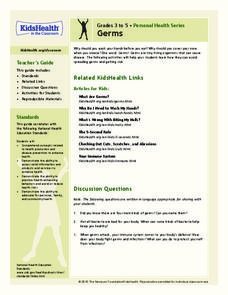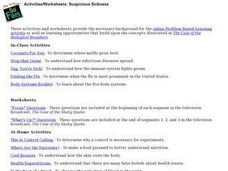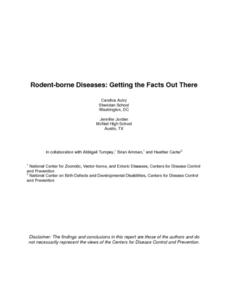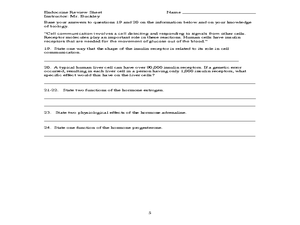Curated OER
Disease and Nutrition
Learners study disease and explore how it can be avoided or treated with simple solutions. For this investigative lesson students create a food chart for two weeks for themselves to track and be sure they are getting all the nutrients...
Curated OER
AIDS, a Modern Day Epidemic
Students discuss global effect of AIDS epidemic, explain how HIV infects the body, and identify the symptoms of AIDS.
Curated OER
How Do White Blood Cells Fight Foreign Organisms That Invade Our Body?
Ninth graders investigate the functions of white blood cells. They watch and discuss an online movie, conduct Internet research, and complete a worksheet.
Curated OER
Bacteria: Friend or Foe?
Young scholars examine a variety of environmental and industrial roles of bacteria. explore where bacteria can be found and distinguish bacteria from other organisms.
Curated OER
"Writing As Healing" Exercise
Students begin with a teacher-leld discussion of recent research, which has found measurable imporovements in patient symptoms even four monthe after their participation in a brief writing exercise about a stressful event in the...
Curated OER
Opportunistic Diseases
Students explore the concept of opportunistic diseases. In this opportunistic diseases instructional activity, students take notes on a lecture regarding systemic herpes, candidiasis, cytomegalovirus, tuberculosis, MAC, recurrent...
Curated OER
Waterborne Diseases
Students compare symptoms of several well-known water-borne diseases. They use the symptoms and background information on the disease to explain some of the aspects in terms of immune response.
Nemours KidsHealth
HIV and AIDS: Grades 9-12
Two activities help high schoolers learn about HIV and AIDS. First, groups read and discuss articles that provide information about sexually transmitted diseases and conduct further research to gather current information. They then...
Curated OER
Organ Systems: Excretory, Digestive, Immune, and Nervous
Eighth graders identify and describe the components of various body systems. They create vocabulary flash cards identifying the excretory, digestive, immune, and nervous systems and describing their functions. Students complete a...
Curated OER
HIV and AIDS Awareness
HIV and AIDS are defined in this lesson plan to raise awareness. Learners will view a film (link to video is provided) about the disease and how it is contracted. They then discuss the film and complete a follow-up worksheet with...
Curated OER
How to be a Healthy Person
High schoolers discuss their health and diseases. In this health lesson, students discover the causes of diseases and the difference between infectious and non-infectious diseases. They find ways to boost their immune system.
Curated OER
Understanding and Avoiding HIV/AIDS
Learners begin the lesson by discussing what they already know about their immune system. In groups, they participate in a true and false game using the facts and myths of HIV/AIDS. They discuss how the disease is affecting their country...
Nemours KidsHealth
Germs: Grades 3-5
Young scholars investigate personal health issues by discussing germs. In this contagious disease lesson plan, students identify ways germs infect our bodies and how we can best protect ourselves. Young scholars discuss food...
Curated OER
Autoimmune Disease
Learners conduct Internet research on an autoimmune disease, and present the information in a PowerPoint presentation.
Healthy Native Youth
Chapter 5: Learning About HIV/AIDS/STI's and Hepatitis Transmission
Middle schoolers delve deep into facts about HIV, AIDS, Hepatitis, and other STI's by way of discussion and a hands-on activity. Scholars ask and discuss questions anonymously using a Question Box. Two experiments showcase the...
PBS
Ebola Outbreak
As of April, 2016, more than 28,000 suspected cases of Ebola were recorded in Western Africa with over 11,000 human deaths. Classes discuss the Ebola virus outbreak in 2014 and then groups develop an action plan based on research,...
Curated OER
Water Microbes and Human Health Exercise
In this water microbes and human health worksheet, students complete a crossword puzzle given 11 clues about different water born illnesses caused by microbes.
Curated OER
Learning about Infectious Diseases
All of the activities and worksheets in this unit relate to learning about how infectious diseases spread & how the body deals with them. There is a collection of problem-based learning activities, as well very useful at-home...
Curated OER
Rodent-borne Diseases: Getting the Facts Out There
Students conduct research of the hantavirus pulmonary syndrome (HPS) or lymphocytic choriomeningitis (LCMV). They obtain the information and create a public announcement in the form of a brochure, newsletter, poster, radio announcement,...
Curated OER
Endocrine Review Sheet
Starting with a diagram of the kidneys and urinary tract of the human, this sheet has questions about excretion, blood concentrations of hormones, gland feedback mechanisms and the effects of some hormones.
Curated OER
Mechanisms to Fight Disease
Students explain how our body fight diseases. In this biology activity, students identify the role of bacteria and viruses in human illness. They create a PowerPoint presentation and essay at the of the unit.
Curated OER
Antibodies and the Immune Response Lesson Plans - Biology Teaching Thesis
Students are introduced to bacteria and their role in biology and finishes with a lab experiment that focuses on antibiotics. They are given an overview of the important concepts involving bacteria and their potential resistance to...
American Museum of Natural History
Gusty: The Gut Microbiome Card Game
Build up your gut. Groups up to four play a card game to learn more about the microbiome in the gut. Learners try to build a healthy gut with their cards. The player acquiring six microbes without any pathogens wins the game.
Curated OER
Understanding and Avoiding HIV/AIDS
Students explore myths and facts pertaining to AIDS. In this AIDS/HIV lessons, students listen to their instructor deliver a lecture regarding the disease and then play a true or false game based on the lecture.





